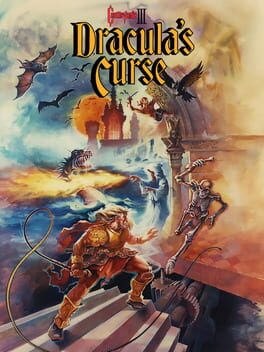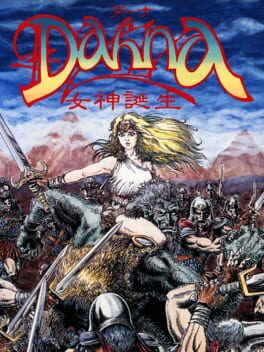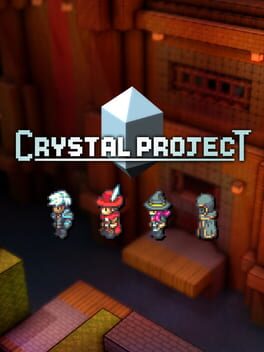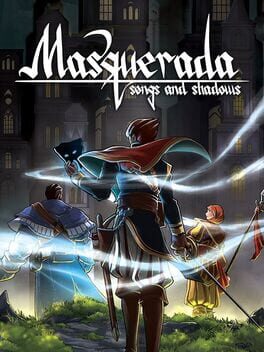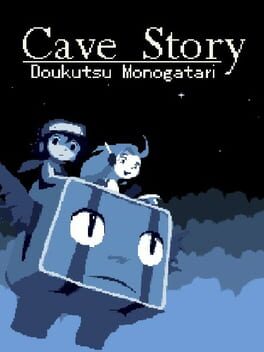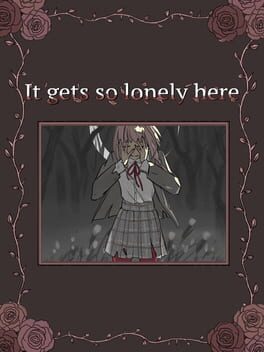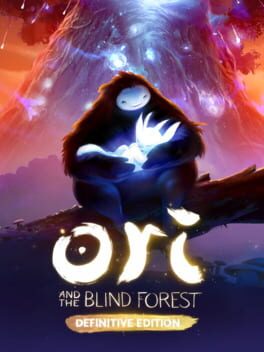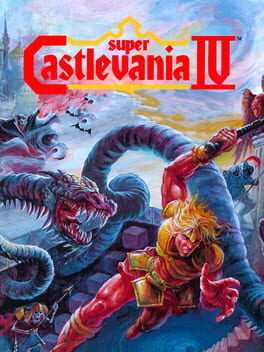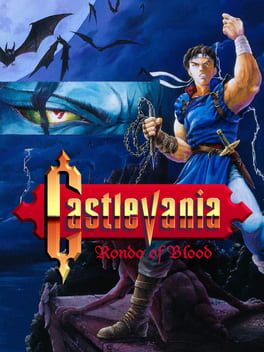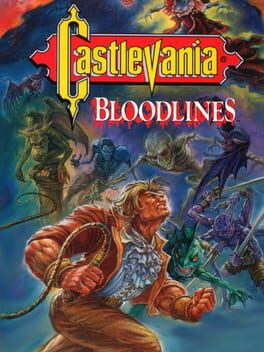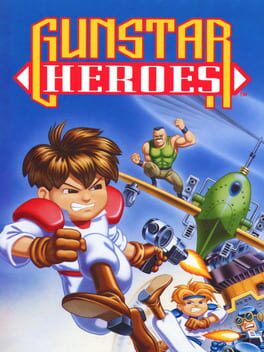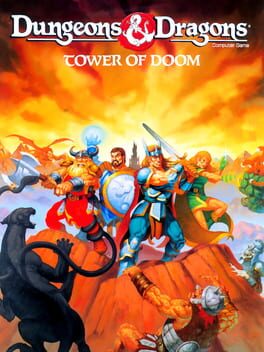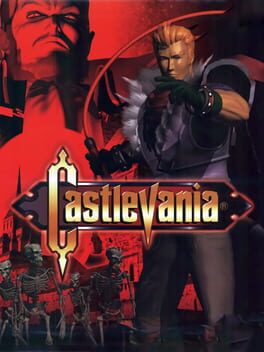ViviMayoi
The best Castlevania title on the NES for sure! Goes back to the more linear, level-based style of the first game while giving the player multiple routes with different recruitable characters you can play as. Even if the game still shows its age in places, it throws less curveballs than the previous games, feels more polished, and has a banger soundtrack. Solid game.
1991
This game has good ideas for its time, but it controls.. pretty badly. It combines beat-em-up and platforming in a way where both of them feel just okay (at the best of times). You get to drift in the air to platform better, but it controls unintuitively. There's a magic system, but there's no real control over it as what spell comes out is entirely dependent on how much magic you have available. The invincibility spell you get at 3-4 magic flashes the screen pretty badly, too. On the plus side, there's multiple sections in the game where you control one of three different mounts, shaking up the gameplay a bit, but some of those sections make it hard to tell what you should be doing to avoid getting hit. At least, the difficulty curve is pretty fair and it looks great for a Genesis game.
2021
This game is charmingly simple and addicting. It's kind of fascinating how different each session can feel when you can only directly control your character's movement. It's good fun to make a cool build with what the game throws at you, then relax and look at the pretty lights while everything blows up.
2022
This game takes the best things about exploration and job systems in RPGs and puts them together in a way that feels so, so right. The game has a lot of heart, has a wide, charming world and feels good to experiment in. Making up a good party with the many character customization options available (job combinations, unlocked passive effects from jobs, modifiable stat growths, equipment) feels really rewarding, too.
It can be a bit unbalanced at times, but jobs all have their chance in the spotlight in a well-composed party. Unfortunately, the story is pretty lacking, as the emphasis of the game is very much on gameplay and exploration; still, Crystal Project executes those so well. Highly recommend :)
It can be a bit unbalanced at times, but jobs all have their chance in the spotlight in a well-composed party. Unfortunately, the story is pretty lacking, as the emphasis of the game is very much on gameplay and exploration; still, Crystal Project executes those so well. Highly recommend :)
Masquerada... Where do I start?
As a game, this is, at best, a very linear mix of a tactical and an action RPG. It's extremely light on the role-playing elements, though, with a small skill tree and unlockable masks being the only real character progression elements. There are no sidequests to speak of, and the world you go through is linear, not letting you explore it as you would like.
As for the combat, the tactical mechanics of it can feel a bit weird, or lacking, though I was lucky enough for it not to be a problem on my end (on Normal difficulty). Overall, it's simple, but pretty fun, especially once you get past the early game and can really play with the Elemental Tag system.
The game's presentation is for sure one of its strong suits — a fun art style, expressive characters, great voice acting, a solid soundtrack. But the game's real worth lies in its story.
The story is nothing short of excellent. The world feels real, the pacing is tight, the character writing hits all the right marks, the plot progresses satisfyingly, and it's all wrapped up in a cohesive package that deals brilliantly with the themes of regrets, grief, friendship, and standing up for what you believe in.
It's hard to say if this game is just a bit of polish or gameplay depth away from being a real gem, or if it might have been better off as a story told in another medium. Either way, I recommend this game to anyone looking to dive into a well-crafted world, filled with characters made with love, as long as you're willing to look past Masquerada's linearity.
As a game, this is, at best, a very linear mix of a tactical and an action RPG. It's extremely light on the role-playing elements, though, with a small skill tree and unlockable masks being the only real character progression elements. There are no sidequests to speak of, and the world you go through is linear, not letting you explore it as you would like.
As for the combat, the tactical mechanics of it can feel a bit weird, or lacking, though I was lucky enough for it not to be a problem on my end (on Normal difficulty). Overall, it's simple, but pretty fun, especially once you get past the early game and can really play with the Elemental Tag system.
The game's presentation is for sure one of its strong suits — a fun art style, expressive characters, great voice acting, a solid soundtrack. But the game's real worth lies in its story.
The story is nothing short of excellent. The world feels real, the pacing is tight, the character writing hits all the right marks, the plot progresses satisfyingly, and it's all wrapped up in a cohesive package that deals brilliantly with the themes of regrets, grief, friendship, and standing up for what you believe in.
It's hard to say if this game is just a bit of polish or gameplay depth away from being a real gem, or if it might have been better off as a story told in another medium. Either way, I recommend this game to anyone looking to dive into a well-crafted world, filled with characters made with love, as long as you're willing to look past Masquerada's linearity.
2004
Still a quintessential indie platformer!
It took me a while to get around to beating this. This playthrough was my third time attempting to clear the game, as both of my previous goes at it got interrupted by PC issues, years ago... and it was so, so worth it to have another try at it.
The platforming feels tight, the level design is great and intuitive, the world is charming, the soundtrack hits hard, and the bosses are super fun; this game's got pretty much everything you could want in a platformer.
The final section needed to achieve a good ending is a huge step up in difficulty from anything else in the game, though. While I was okay with it, I could see it being daunting or frustrating for some. It was a lot of fun to learn and master the game's final level, and that last hit on the final phase of the final boss gauntlet was as satisfying as beating a game can get :)
It took me a while to get around to beating this. This playthrough was my third time attempting to clear the game, as both of my previous goes at it got interrupted by PC issues, years ago... and it was so, so worth it to have another try at it.
The platforming feels tight, the level design is great and intuitive, the world is charming, the soundtrack hits hard, and the bosses are super fun; this game's got pretty much everything you could want in a platformer.
The final section needed to achieve a good ending is a huge step up in difficulty from anything else in the game, though. While I was okay with it, I could see it being daunting or frustrating for some. It was a lot of fun to learn and master the game's final level, and that last hit on the final phase of the final boss gauntlet was as satisfying as beating a game can get :)
I really like the writing in this. The way the story is narrated gives a really strong impression, what with the snarky, overly familiar narrator addressing the protagonist directly in second person. The aesthetic of it all is just amazing, with a captivating soundtrack and visuals that range from charming to haunting, but always remain beautiful.
Saying more without spoiling the experience would be difficult, so I'll just assure you that this is as good as it is gay!!
Saying more without spoiling the experience would be difficult, so I'll just assure you that this is as good as it is gay!!
Ori and the Blind Forest is a great platformer, but it might be lacking in combat systems and replayability if those are things you care about in metroidvania games.
The platforming itself feels great, with every new mechanic you get access to throughout the game lending itself very well to making movement feel fluid and seamless. Combat is a bit on the dull side, with very few differing enemy designs across the whole game, the player often getting to meet reskinned enemies with slightly different behavior and upgraded stats as they progress. As such, there are no bosses, with chase sections that test your platforming skills taking their place. This admittedly fits the game's strengths to a T.
Outside of gameplay, the game's visuals, sound design, OST and the storytelling complement each other perfectly to deliver a great atmosphere and make the forest of Nibel feel alive. Exploring the wilderness is made very intuitive thanks to how the in-game map functions, though it might make it a bit too easy if exploring is what you enjoy most out of a metroidvania.
Very fun, and I'll likely play it again! For sure recommend it.
The platforming itself feels great, with every new mechanic you get access to throughout the game lending itself very well to making movement feel fluid and seamless. Combat is a bit on the dull side, with very few differing enemy designs across the whole game, the player often getting to meet reskinned enemies with slightly different behavior and upgraded stats as they progress. As such, there are no bosses, with chase sections that test your platforming skills taking their place. This admittedly fits the game's strengths to a T.
Outside of gameplay, the game's visuals, sound design, OST and the storytelling complement each other perfectly to deliver a great atmosphere and make the forest of Nibel feel alive. Exploring the wilderness is made very intuitive thanks to how the in-game map functions, though it might make it a bit too easy if exploring is what you enjoy most out of a metroidvania.
Very fun, and I'll likely play it again! For sure recommend it.
1991
This game is a much more fluid take on the classic Castlevania gameplay, but it still has a lot of weird design decisions and loves blindsiding the player at times. The game is beautiful-looking and -sounding, with a lot of cool new concepts and a more complete toolkit for Simon compared to the previous games. Some strangely frustrating level design and a harsh difficulty curve gets in the way of enjoying SCv4 to the fullest, but it's still good fun.
For sure the best entry in the series pre-PlayStation era. If not for the difficulty being a bit low, I'd have nothing bad to say about this game. The level design is great, the music slaps the whole way through, the stages are beautiful and varied... Gameplay-wise, Richter and Maria both offer fun and meaningfully different playstyles, which really helps cement this game as my favorite classic Castlevania title.
A pretty good entry in the series, if a bit unremarkable. Some annoying boss design and short length compared to what came before it make it less memorable than other classic titles. Eric and John are also not that different, which doesnt make replaying it an enticing offer. Still a fun game, with the trademark aesthetic polish of Castlevania. Worth playing for classic CV fans!
I've been playing the Castlevania franchise for the first time as part of a marathon of some kind, and I awaited the moment where I got to this game with impatience. I heard a lot of good about Symphony of the Night, and I can say that it still surprised me. It's an amazing first entry in the metroidvania genre for the franchise which lended part of its name to said genre... and for good reason.
Despite being more than 20 years old as of the time of writing, very little about the game feels like it, if not for the crusty, poorly translated English dialogue of the original PlayStation version. It is incredibly polished, executing the now-proven metroidvania formula better than so many other games it inspires. Combat is fun, with a good learning curve as you obtain new weapons, learn new spells and constantly find new tools to try out against more and more varied enemies.
A crucial part of metroidvania games is how fun the main gameplay loop is — that of exploring the play area, and obtaining new tools to traverse it and progress. Well, good news: exploring and traversing the castle is a joy all throughout. Controlling Alucard is intrinsically fun, thanks to how tight movement feels from the start. With all the options he gradually gets access to as you guide him towards his objective, movement becomes even more satisfying as you progress.
The aesthetics of the game are strong, with a great soundtrack (in classic Castlevania fashion), accompanied by sound effects that amplify every impact, every action Alucard and his foes take. The spritework and background art are sublime through and through, with the game having visuals that are still referenced and emulated decades later.
If this game falls short of perfect, it's only because of minute issues. There are the aforementioned dialogue issues, yes, but that is hard to hold against the game when they were changed in future ports. My main gripes are with some few, yet really obtuse secrets that the game hints you towards in no capacity. It can get frustrating when trying to reach full completion like many metroidvania fans(read: me...) are wont to do, You may find yourself relying on a guide if you're looking to achieve that.
That said, those issues are tiny details in a pool of greatness. Don't let that detract you from playing Symphony of the Night! It's a superb game that provides hours of fun and is, for sure, a highlight of the series so far. I'm sure I'll find myself replaying it soon enough!
Despite being more than 20 years old as of the time of writing, very little about the game feels like it, if not for the crusty, poorly translated English dialogue of the original PlayStation version. It is incredibly polished, executing the now-proven metroidvania formula better than so many other games it inspires. Combat is fun, with a good learning curve as you obtain new weapons, learn new spells and constantly find new tools to try out against more and more varied enemies.
A crucial part of metroidvania games is how fun the main gameplay loop is — that of exploring the play area, and obtaining new tools to traverse it and progress. Well, good news: exploring and traversing the castle is a joy all throughout. Controlling Alucard is intrinsically fun, thanks to how tight movement feels from the start. With all the options he gradually gets access to as you guide him towards his objective, movement becomes even more satisfying as you progress.
The aesthetics of the game are strong, with a great soundtrack (in classic Castlevania fashion), accompanied by sound effects that amplify every impact, every action Alucard and his foes take. The spritework and background art are sublime through and through, with the game having visuals that are still referenced and emulated decades later.
If this game falls short of perfect, it's only because of minute issues. There are the aforementioned dialogue issues, yes, but that is hard to hold against the game when they were changed in future ports. My main gripes are with some few, yet really obtuse secrets that the game hints you towards in no capacity. It can get frustrating when trying to reach full completion like many metroidvania fans
That said, those issues are tiny details in a pool of greatness. Don't let that detract you from playing Symphony of the Night! It's a superb game that provides hours of fun and is, for sure, a highlight of the series so far. I'm sure I'll find myself replaying it soon enough!
1993
As far as run & gun games go, Gunstar Heroes is my favorite in the genre. Fun weapon system? Check. Varied environments to run through? Check. Really cool boss design? Check.
The game is such a joy to play in co-op, and the non-weapon attacks you have (throwing enemies / the other player, air attacks, sliding) feel like an integral part of your arsenal, too. It's just a great game all around.
The game is such a joy to play in co-op, and the non-weapon attacks you have (throwing enemies / the other player, air attacks, sliding) feel like an integral part of your arsenal, too. It's just a great game all around.
An alright beat 'em up game, with some interesting ideas, nicely differing movesets, and branching paths. Two of the characters have access to reusable spells, making each half of the playable cast rather different. Playing it in 2023 doesn't do it any favors, as it definitely plays like most beat 'em up titles from its era. Still a fun game, just rather unmemorable.
1999
I've only played this game as Carrie, so this is a review of her side of the game. This is quite the rough passage to 3D for the franchise.
Castlevania 64 has its fair share of problems. Unintuitive controls, prime early-3D camera problems, confusing level design coupled with very similar-looking areas in a lot of said levels, and very basic bosses that can be beaten with the same strategy with very little thought for what's going on (charging Carrie's homing attack and running in circles around the boss). The game has a wonky camera and weird controls, yet expects you to perform tight platforming all the same, sometimes with enemies around; oftentimes, it will feel more frustrating than hard.
The soundtrack, while good, couldn't really carry the game for me. Still, it has checkpoints in good places most of the time and while it can be frustrating, the player is usually given a chance to retry not too long afterwards. It still has the heart of a Castlevania game, but it lacks polish and love.
Castlevania 64 has its fair share of problems. Unintuitive controls, prime early-3D camera problems, confusing level design coupled with very similar-looking areas in a lot of said levels, and very basic bosses that can be beaten with the same strategy with very little thought for what's going on (charging Carrie's homing attack and running in circles around the boss). The game has a wonky camera and weird controls, yet expects you to perform tight platforming all the same, sometimes with enemies around; oftentimes, it will feel more frustrating than hard.
The soundtrack, while good, couldn't really carry the game for me. Still, it has checkpoints in good places most of the time and while it can be frustrating, the player is usually given a chance to retry not too long afterwards. It still has the heart of a Castlevania game, but it lacks polish and love.
